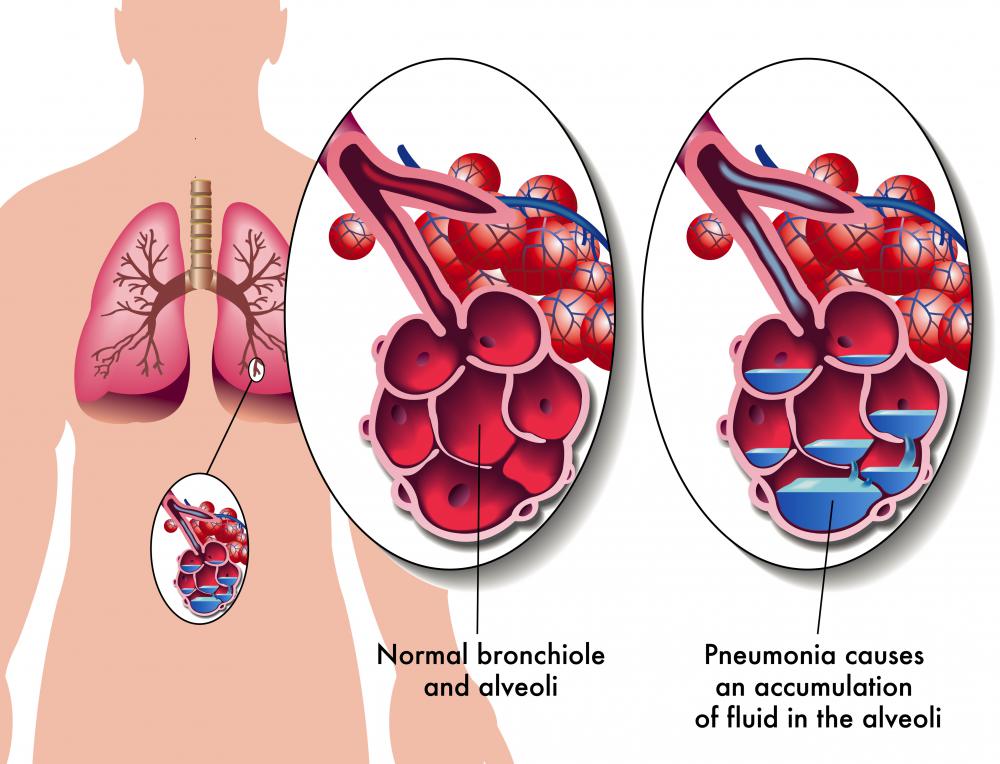At TheHealthBoard, we're committed to delivering accurate, trustworthy information. Our expert-authored content is rigorously fact-checked and sourced from credible authorities. Discover how we uphold the highest standards in providing you with reliable knowledge.
What Is Refractory Hypoxemia?
Hypoxemia is a condition in which the levels of oxygen in blood are too low. Refractory hypoxemia is rare and refers to hypoxemia that cannot be corrected by giving the patient extra oxygen to breathe. It usually develops as the end result of a condition known as acute respiratory distress syndrome, in which breathing becomes extremely difficult. A number of techniques have been tested to treat this condition, but no really effective therapies have been found. Hypoxemia is a form of hypoxia, which is a more general term used to describe low oxygen levels in any part of the body, including tissues and blood.
There are numerous causes of hypoxemia including anemia, high altitude and an obstructed airway. The most common causes leading to respiratory distress syndrome, which is associated with hypoxemia, are pneumonia or an infection that overwhelms the whole body. Normally, hypoxemia can be improved by giving patients oxygen, but refractory hypoxemia does not respond to this treatment.

Often, refractory hypoxemia comes about because the air spaces inside the lungs are full of fluid. This could be the result of bleeding into the lungs, infection or heart failure. As the air spaces are filled with fluid, this prevents inhaled oxygen from passing into the blood vessels that line the lung spaces and entering the blood stream. In this situation, in spite of administering oxygen, blood oxygen levels remain abnormally low.

The signs of hypoxemia include increased breathlessness, confusion and loss of consciousness. If the lungs are full of fluid, doctors may be able to hear characteristic crackling noises when listening to the chest through a stethoscope. Refractory hypoxemia is diagnosed when blood oxygen levels fail to improve after treating hypoxemia with therapies such as extra oxygen and mechanical ventilation.

A number of potentially beneficial treatments for refractory hypoxemia have been tested. These include having patients lie on their fronts, using special ventilation techniques where smaller than usual volumes of air are given at a faster rate, and administering drugs which dilate blood vessels in the lungs. Having the patient lie in this position is thought to help breathing by enabling air spaces in the lungs to open up. In another treatment, blood is pumped away from the body through an artificial lung in order to increase oxygen levels, before being returned to the patient. Unfortunately, none of the therapies tested has shown a significant improvement in the survival rates of patients with this condition.
AS FEATURED ON:
AS FEATURED ON:















Discussion Comments
@orangey03 – It is very sad that people have to die this way. Hopefully, researchers will one day find a way to save people from refractory hypoxemia. After all, we have so many cures and treatments today that we didn't have twenty years ago, so I believe it's possible.
My grandmother died from pneumonia, and I think that refractory hypoxemia is what ultimately killed her. Near the end, she had a lot of trouble breathing, and it finally got so bad that even the ventilator couldn't help.
I had a hard time dealing with her death. I kept picturing her struggling for her last few breaths, and I kept imagining what it must have been like to slowly suffocate while the doctors rushed around, trying everything but being unable to save her.
This sounds like what my dog must have went through before she died. The vet said that her lungs were filled with fluid, and she passed away during the night as she was receiving treatment.
What's so bad is that we never knew what caused this condition in the first place. The vet had only two theories: poison or cardiomyopathy. Since we had no poison around the house, I believe it was the latter.
I really hate to think that even oxygen treatment couldn't save her. It sounds like nothing can save an animal or a person from refractory hypoxemia.
Post your comments